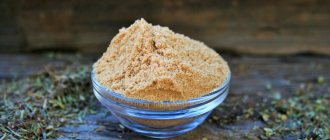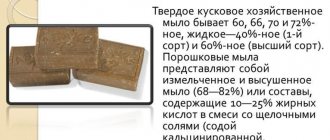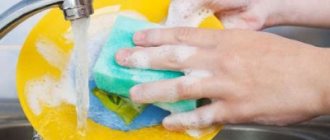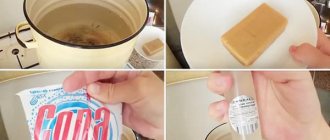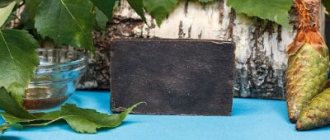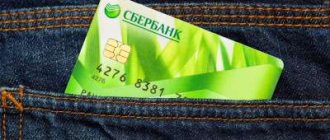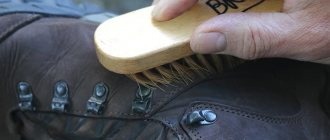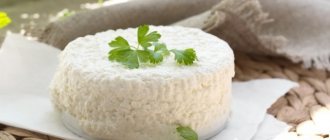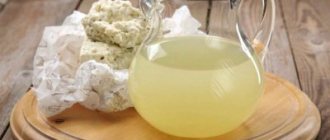People involved in washing dishes should be aware that the use of chemical detergents does not come without consequences. Our hands suffer, chemical residues remain on the plate, we eat them, which means harming our health. Instead of store-bought products, it is better to use folk remedies that do not contain chemicals.
Danger of detergents
Chemicals contained in purchased preparations may remain on the surface of the dishes after the cleaning procedure. It will not be possible to completely wipe them off. They will enter the human digestive tract. It is estimated that within one year you can accidentally consume approximately 500 ml of detergent compositions. The health effects may be unpredictable. First, allergic reactions begin, which can lead to tumors of the gastrointestinal tract.
Attention!
If you are still accustomed to store-bought drugs and do not want to give them up, then wash the dishes immediately after each meal.
By getting into the habit of washing mugs and bowls after every meal, you will be able to save detergent, since fresh stains are washed off with warm water. You won’t end up with mountains of dishes that will then take a long time to wash.
Instead of store-bought ones, gradually move on to the following folk remedies:
- laundry soap;
- mustard;
- baking soda;
- soda ash.
All these products have advantages, but are not without disadvantages. But all the disadvantages that we will describe here will still cover the advantages of a conventional chemical product.
Coffee
Coffee paste for washing dishes has become a favorite product of many housewives. The product does not foam, but does not interfere with the easy removal of any dirt, even in cold water. For better effect, add laundry soap. The full set of ingredients looks like this:
- water – 250 ml;
- soap – 100 g;
- coffee – 50 g;
- lemon zest – 50 g;
- borax in glycerin – 1-2 g;
- vinegar or lemon juice - 1 tbsp. l.;
- soda - 1/4 pack.
The result after cleaning coffee is no worse than after chemicals.
Preparing a natural remedy with your own hands begins with rubbing soap, borax and vinegar in warm water. Leave the mixture for 3-4 hours - this time is enough for the ingredients to completely dissolve. Then add soda, stir - the composition will have a thick consistency.
The last step is to add coffee, grated crust and mustard powder. The first two components act as abrasives and easily remove burnt-on food and old dirt. Stir vigorously again and pour into a container. In the case of a thicker mixture, the amount of liquid can be reduced at any time by pouring out excess water. The result will be a coarse dishwashing liquid that you will remove from the jar using a sponge.
Washing dishes with laundry soap
Washing with laundry soap is one of the universal methods that can be used in everyday life. This substance consists entirely of natural ingredients, vegetable and animal fats, which cannot cause any harm to health. Laundry soap can be used as a disinfectant.
Attention!
The advantage of this cleaner is that after use it can be easily washed off with water.
There are several ways to use soap. Firstly, you can lather it on a sponge, and then wash off the fat with the sponge. Secondly, you can grate it into small particles, melt them in water, and use this liquid for washing.
But if you do not wear gloves during the cleansing procedure, you need to remember that this product greatly dries out human skin, so many women refuse this product. But such effects on the skin can be avoided if you put rubber gloves on your hands before washing. In general, this is a universal way to keep your hands safe.
Laundry soap isn't the only home remedy you can use to clean pots and pans. There are other effective substances.
Let's go back to history
Cleaning products like “Fairy” appeared on the market in the mid-to-late 90s of the last century. Then it was a breakthrough! With one drop you could wash off a mountain of dishes that had accumulated after your birthday. And the smells: spring bouquet, citrus mix, green apple... However, today the issue of safety rises above efficiency, cost-effectiveness and a pleasant aroma. Expensive environmentally friendly products are increasingly appearing in advertising. But instead of overpaying for foreign innovative developments, it is worth remembering what Russian women successfully used.
Do you remember how in K.I. Chukovsky’s fairy tale “Fedorino’s Grief” Fedora called the runaway dishes home and promised to clean them with sand and pour boiling water over them? This is one of the ancient ways of washing dishes. In the old days, dishes were rubbed with sand, sedge, nettle, and washed with lye (an aqueous infusion of wood ash). By the way, sand and grass are still used by tourists.
Later, laundry soap, baking soda, and mustard appeared on the sinks of Soviet women. These products, which can always be found in any kitchen, perfectly wash dishes, while being completely safe. They are the ones you should focus on if the housewife is concerned about the safety of the detergent.
Washing dishes with mustard
Mustard is capable of absorbing fat, so it is used when it is necessary to wash off thick layers of fat on pots and cups. Often, mustard is used after washing with their usual product, to remove residual grease and chemicals from the surface of plates and cups.
Attention!
For proper use, you need to wet a wet sponge and dip it into a container of mustard.
But this method is not without its drawbacks. Mustard powder is unevenly distributed over the sponge and in the container and runs out very quickly.
The second way is to dissolve the powder in water, and the resulting solution will be used for washing. But with this method, you will have to shake the container where the solution will be located each time, since mustard does not dissolve well in water and will settle to the bottom. With this option, you can use mustard powder longer.
Heavily soiled plates that have been left in the sink are unlikely to be washed using mustard powder. Housewives first carry out the procedure in the usual way, and only then, when repeating the approach, use mustard. Those who believe that the method of using mustard is economical are mistaken, since it lasts for a very short period of time compared to the usual means.
Salt
An excellent abrasive. Salt disinfects and helps remove heavy stains both in the kitchen and bathroom.
— Salt is added to water when washing floors, it disinfects.
— You can sprinkle salt on a wool carpet, leave it for a while, then vacuum it: it will become much cleaner.
— You can wash kitchen towels in a salt solution; this will have a bleaching and disinfecting effect.
Article on the topic
Rub until shiny. What you can and cannot wash windows with
Washing dishes with soda
There are two types of soda: baking soda and soda ash. Each of them has advantages, as well as one big disadvantage. Soda powder is highly corrosive to the skin, so either immediately abandon this option, or use protective agents, which we have repeated more than once.
Baking soda has no disadvantages, as it can be used for any type of dishwashing. It copes with many types of dirt; you can even clean stains left by tea or coffee with it. All you need to do is dissolve the powder in water: one tablespoon per liter of liquid.
Attention!
Soda has one important advantage. It very effectively cleans all plaque and scale, returning the dishes to their original shine.
Soda is environmentally friendly, so it can be used for allergy sufferers and children. You can combine soda with mustard, as the cleaning effect is much better than separately.
Soda ash has been used since ancient times. It has been used in households for many decades. But you must immediately understand that it is very caustic, so we recommend wearing gloves. The product can be used in different ways; one of the universal ways is to leave a solution of soda and water on the surface of items prepared for cleaning. It will get wet and will be easy to clean any surface afterwards.
The second method is to pour baking soda powder onto a damp sponge and wash the dishes with it. If you need to remove fat, it is best to dissolve a few tablespoons in hot water. Soak bowls and plates in this solution. But after this method you need to rinse them thoroughly.
If we talk about other methods, they are less effective than those that we have described, so there is no point in dwelling on them. We only write about things that may interest you, so we can give you some tips on how to organize your work so that it is not a difficult process.
Homemade Dishwasher Remedies
Many housewives know that vinegar can be poured into the rinse aid compartment. Regular table vinegar gives a unique shine to glasses and cups. In our opinion, shelling out decent amounts for a small bottle of mouthwash is unreasonable and uneconomical.
What should you put in the main compartment to wash dishes in the dishwasher? We offer two options for mixtures that you can make yourself.
Natural dishwasher cleaner #1
Mix baking soda and borax in equal parts.
Pour into a jar with a tight-fitting lid and shake. Ready. Pour about a teaspoon of product into the main compartment of the dishwasher. A little more, a little less - see for yourself by the degree of soiling of the dishes. A reasonable question: how safe is borax? Let's dispel the myths. Borax is a mineral that is mined directly from the earth. The biggest confusion arises from the fact that borax is confused with boric acid. Boric acid is the result of a chemical reaction of borax with another acid (usually sulfuric or hydrochloric). Borax can cause irritation on the skin, but it hardly penetrates the pores. In the American classification, this substance is assigned class 1, the same as soda and salt. So borax is a natural and safe ingredient to use.
Natural Dishwasher Cleaner #2
Here you will need a glass of dishwashing liquid, the recipe for which we will give below, and a quarter glass of soda. Mix thoroughly and transfer to a jar with a lid. One or two teaspoons are required for the dishwasher to thoroughly clean all the dishes. Remember to scrape any food residue off your dishes before loading.
Washing Tips
We recommend that you follow our tips when washing dishes:
- Wear gloves when working. This way you will protect your skin from the aggressive components of the detergent.
- Soak contaminated items in water or in the solutions we wrote about, so that later it is easy to wash off all the accumulated dirt, even with ordinary water.
- It is better to air dry washed bowls and plates. Place them on a drying rack so that all the water drains quickly. Drying warm dishes does not lead to the formation of deposits on them.
- Use suitable sponges because this will give you the opportunity to thoroughly wash away all the dirt from any items. It is better to find and buy sponges from well-known manufacturers. If you have several sponges, then one of them should be dry.
- If you need to scrub Teflon or ceramics, then look for sponges that are designed specifically for this. Believe me, they are sold in the store. On dishes that have been in contact with fish and meat, you must use a separate sponge.
- A combination sponge will not cope with cleaning dried food residues. Be careful when choosing a sponge, because it can greatly facilitate the washing process if you choose it correctly.
- Get into the habit of washing cups, saucers and plates immediately after finishing lunch or dinner. The dirt that has not yet hardened will be washed off faster; the procedure will take very little time.
Follow our advice and decide which product you need. Conduct experiments with solutions, combine with drugs, look for the most suitable and safe methods and means. It’s good if you can replace a purchased drug with a folk remedy, without losing the quality of washing.
How do you like the article?
Vinegar
It can’t handle grease alone, but it will help disinfect dishes and destroy mold and viruses. It is for the purpose of disinfection that you can spray washcloths and dishwashing sponges with vinegar and add it to cleaning pastes. Vinegar copes well with stains on glassware; for example, you can wipe glasses with it. Wash mirrors, windows, remove stains on taps. You can also disinfect your refrigerator and bathroom tiles with vinegar; it fights mold infestation in damp areas.
Question answer
How to clean properly, according to the Japanese method?
